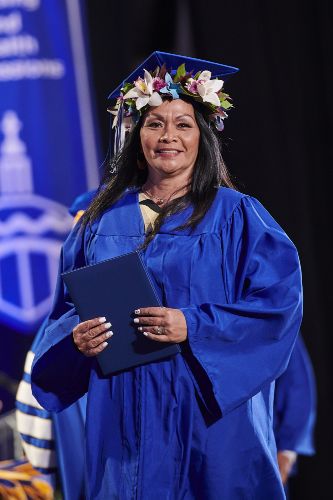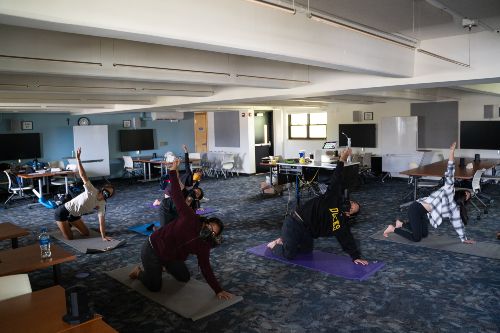The road Kimmy Takata ’22 took to college wasn’t traditional—or easy.

But while she says much of her life has been defined by struggle, Takata is choosing to focus on everything she’s accomplished and all the people who have helped her along the way. “My journey has been one from trauma to transformation,” she said, on a recent afternoon. “It takes a village to save somebody and it took 10 villages to save me, including the village I found at Chaminade.”
Now the 53-year-old is setting her sights on new goals—from serving as a mentor to other women exiting prison to even going back to school to pursue a graduate degree. She said her story is an example of what’s possible when you work hard, dream big and get plenty of help along the way.
“People believed in me. That’s the key,” she said.
Takata wasn’t always confident in herself.
As a child growing up in an abusive household, she struggled with low self-esteem. She said she was constantly being called “dumb” and “stupid”—and often heard those words in her head when she was at school. Throughout her teens, Takata was in and out of youth lockup and struggled with drugs.
Eventually, she dropped out of school.
“I never even thought of myself going to college,” she said. “College wasn’t even in my vocabulary.”
In the years that followed, things got worse for Takata. And then, she hit rock bottom.
She was arrested and charged with 16 counts and sentenced to 40 years behind bars. Then in 2003, Takata escaped from Oahu Community Correctional Center and was gone for four days. When she was arrested again, she was transferred to a women’s prison and placed in lockdown “for a very long time.”
She thought that all was lost. But it was at that moment things started to turn around.
Takata was given the chance to enroll in classes and earned got her GED. She also participated in a program that allowed her to share her story through poems—pieces that she eventually shared with her children to help them understand her grief about how much of their lives she’d missed. And she was placed in a substance abuse program, where she was encouraged to continue her journey of self-reflection. “I really had to take a look at the damage I’d done to everyone,” she said.
After getting out of prison on parole, Takata knew she had to make the most of out of her new perspective. She got a job and paired up with the Pu’a Foundation, which helps incarcerated women transitioning back into the community. “I was locked up for 15 years. The transition wasn’t easy,” Takata said. But she eventually got her sea legs. And then, she started looking for opportunities.

Friends encouraged her to go back to school. And at first, she didn’t even entertain the idea. It was too far-fetched. “I’m not good enough for college,” she remembers thinking. “I’m not smart enough and I’m scared.” But her friends and mentors didn’t give up. And before long, she found herself enrolling.
With the help of the Pu’a Foundation, she first enrolled at Kapiolani Community College.
From there, she found her way to Chaminade University. Bro. Dennis Schmitz, of the Marianist Center of Hawaii, happened to work with the Pu’a Foundation and encouraged her to apply. Takata also clinched a Hooulu Scholarship, which covered her tuition and included robust career development and advising resources.
On her first day of classes at Chaminade, Takata couldn’t believe how far she’d come.
“It was like Disneyland to me,” she quipped. “I found myself smiling all day long.”

And while she had plenty of jitters about going back to class, she found no shortage of professors, counselors and peers ready to cheer her on—and give her the help she needed. As an Environmental Studies major, Takata formed a particularly strong bond with Dr. Gail Grabowsky, dean of the School of Natural Sciences and Mathematics and director of the CIFAL Honolulu Center at Chaminade.
In fact, she still keeps in touch with Grabowsky.
“She is absolutely the best professor in the world,” Takata said. “Her classes were hard, but she’s understanding. She helped me realize going back to school was the best thing I ever could have done.”
After a lot of hard work, Takata made it to graduation day—and invited friends to cheer her on.
Now she’s working with women as they leave prison, using her own life as a case study of what’s possible. She’s also ready to jump into the next big challenge. She’s seriously considering the master’s program in Criminal Justice Studies at Chaminade and is also busy growing a cleaning business on the side.
“There’s just so many things I want to do,” she said. “And I’m ready for anything.”
























